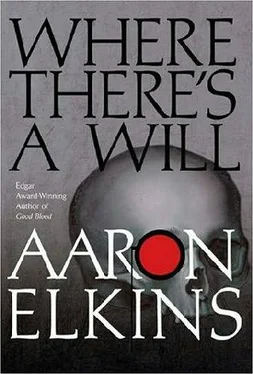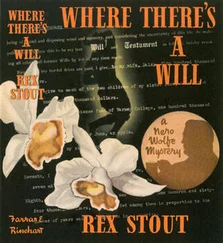Aaron Elkins - Where there's a will
Здесь есть возможность читать онлайн «Aaron Elkins - Where there's a will» весь текст электронной книги совершенно бесплатно (целиком полную версию без сокращений). В некоторых случаях можно слушать аудио, скачать через торрент в формате fb2 и присутствует краткое содержание. Жанр: Классический детектив, на английском языке. Описание произведения, (предисловие) а так же отзывы посетителей доступны на портале библиотеки ЛибКат.
- Название:Where there's a will
- Автор:
- Жанр:
- Год:неизвестен
- ISBN:нет данных
- Рейтинг книги:4 / 5. Голосов: 1
-
Избранное:Добавить в избранное
- Отзывы:
-
Ваша оценка:
- 80
- 1
- 2
- 3
- 4
- 5
Where there's a will: краткое содержание, описание и аннотация
Предлагаем к чтению аннотацию, описание, краткое содержание или предисловие (зависит от того, что написал сам автор книги «Where there's a will»). Если вы не нашли необходимую информацию о книге — напишите в комментариях, мы постараемся отыскать её.
Where there's a will — читать онлайн бесплатно полную книгу (весь текст) целиком
Ниже представлен текст книги, разбитый по страницам. Система сохранения места последней прочитанной страницы, позволяет с удобством читать онлайн бесплатно книгу «Where there's a will», без необходимости каждый раз заново искать на чём Вы остановились. Поставьте закладку, и сможете в любой момент перейти на страницу, на которой закончили чтение.
Интервал:
Закладка:
Inge was wrong about its being no big deal. It could turn into a very big deal indeed, with outcomes that none of them would care to see. The important thing was going to be to keep the police out of it. And that might not be so easy, inasmuch as they were already aware the plane had been found. But the more he thought about it (and the more of the martini he drank), the more it seemed to him that there might not be so much to worry about after all. Really, why should the police want to get involved again? So the plane had been found. So there were human remains in it. What did that prove? What unanswered questions did it raise?
No, if they handled this calmly and rationally and made sure they were all on the same wavelength, there would be no problem. He went to the railing, taking in his vast domain of sea, sand, and hotel, thoughtfully swirling the ice in his glass. Almost directly below him, adjacent to Kuhio Beach Park, was the Waikiki Division of the Honolulu Police Department, which shot another little jolt of worry through him. Not about HPD itself-they had nothing to do with it-but about John Lau, who had worked in that very building before he’d hired on with the FBI. The idea of having an FBI agent and ex-cop hanging around at this particular time, even an old friend of the family’s like John, was a little nervous-making. And that friend he was bringing-Gideon Something? Oliver Something? Wasn’t he some kind of forensic expert, too?
He shook his head slowly back and forth. They were going to have to watch their step, all right.
Oh boy.
THREE
“Billie? Hi, it’s Norma. Guess where I am right this minute. I’m sitting on the plane in Honolulu. Yes, I am…”
What was this irresistible impulse, Gideon mused, sitting six or seven rows in front of the speaker, that compelled people to flip open their cell phones the second they got on a plane or train, and inform someone, somewhere, that they had just gotten on a plane or train? And what was it that then turned ordinary, perfectly-normal-voiced men and women into people who could be heard-who couldn’t be ignored-from six or seven rows away?
Ah, well, these were mysteries best left for another day. Right now, he didn’t intend to let anything bother him during the brief flight to the Big Island. He was relaxed, even a bit sleepy, he was looking forward to the next few days, and he was, frankly, a little hung over-enough to want to do nothing but vegetate for the next forty-five minutes, looking down on blue water and lush green islands, and maybe catching a doze or two.
At a large-boned, well-put-together 6’1” he was cramped in the window seat, but he was used to that, and in a flight this short it wasn’t going to bother him. It’d be nice, though, if the aisle seat beside him remained empty. Now there was another mystery for you: Why did the seat next to you so often remain appealingly vacant until the last minute, so that you got your hopes up, only to have a sweating, panting 250-pounder come jogging down the aisle just as the door closed and the jet-way swung aside? He sighed. How the gods loved to toy with our emotions.
Gideon Paul Oliver, Professor of Physical Anthropology at the University of Washington’s Port Angeles campus, was, in general, feeling pretty good. He was coming from the annual meeting of WAFA, the Western Association of Forensic Anthropologists, held this year at the Army’s Central Identification Laboratory at Hickam Field in Honolulu. He’d caught up on things, presented a paper on blunt-force post-cranial trauma, contributed an oddball item or two to the guess-what-happened-to- this quiz (a much-pitted cervical vertebra that had been through the digestive system of a cougar; a scapula that had been perforated by a pneumatic riveter), and renewed some friendships. His only mistake, and it wasn’t much of a mistake, had been the extra couple of beers at the annual pizza party last night.
He was on his way now, or would be when the 717 took off, to Kona Airport on the island of Hawaii, some 125 miles to the south. He’d been to Kona before, and to Hilo on the opposite coast as well, but he’d never spent any time in the northern uplands of the Big Island, other than to drive through them on his way from one coast to the other. He’d also never spent any time on a working cattle ranch. Now he’d be doing both, thanks to John Lau.
John, a special agent at the FBI’s Seattle office, wasn’t quite Gideon’s oldest friend, but he was the closest. A big, hearty, resilient man with whom Gideon had worked on several cases, he had once saved Gideon’s life on a flowered hillside above Germany’s Rheingau. Gideon had returned the favor a few years later in Normandy, on the treacherous tidal flats of Mont St. Michel. As if that weren’t enough, the two men had simply clicked from the beginning, and now Gideon and his wife Julie, and John and his wife Marti, were a frequent foursome for dinner in the city, at a Mariner game at Safeco Field, or on a hike in the Olympics.
John was a native Hawaiian, born to a Tahitian-Chinese mother and a Hawaiian father, and though he had lived on the mainland for almost twenty years the lilt of the islands was still in his speech and in his laugh. Once every couple of years he and Marti went to stay with his relatives near Papeete and in Hilo, and when he realized that this year’s family visit coincided with Gideon’s trip to Honolulu for the anthropological meetings, he had suggested that Gideon stay on in the islands. He could hop a plane to the Big Island and spend a week or so in the clean, fresh air of the Little Hoaloha cattle ranch, a sprawling, eleven-thousand-acre spread owned by his old college friend Axel Torkelsson. It had been Axel himself who had extended the invitation, and he’d generously included Julie in it, which naturally cinched it once she’d heard about it. Julie, a supervising park ranger at Olympic National Park headquarters in Port Angeles, was an enthusiastic horsewoman, and the prospect of a vacation spent cantering over open rangeland on well-trained horses was too much for her to resist. Especially in Hawaii. She would be arriving in a couple of days for a week’s stay before they all headed back the following Friday.
And that was something Gideon was very much looking forward to as well. Even after seven years of marriage, the last four days had seemed like a long, long time to be away from her.
As expected, the Law of Late-Arriving Seatmates was in full force. Five seconds before the door was pulled shut, a flushed, flustered-looking woman came trotting down the aisle, hauling a wheeled carry-on and juggling three plastic ABC Store plastic bags and a hefty purse. She wasn’t sweating and she wasn’t a 250-pounder, but you could see from the look of her that she was something worse: an affable, inquisitive chatterer. So he was not to have his forty-five minutes of peace after all. With an inward sigh and an outward smile he got up to help her get her carry-on into the overhead rack, and then to try to stuff the rest in after it.
“Just push’em in,” she said cheerfully. “It’s just junk.”
Once she sat down beside him and strapped herself in, she looked appraisingly at him for a few seconds, then apparently decided that the hard-backed book she’d brought with her would be more entertaining. She opened it to the book-mark, and was quickly, deeply absorbed. Gideon caught a glimpse of the title: Making Compost in Fourteen Days.
It made him laugh. He propped a pillow against the window, leaned his head on it, and was asleep, still chuckling, before the plane left the runway.
Among the few contributions that Hawaiian has made to the language of science are the words for two common types of volcanic lava: pahoehoe and a’a. On the Big Island of Hawaii, pahoehoe predominates, familiar to anyone who has ever watched a television documentary on the unending eruptions of Kilauea, the world’s most active volcano, in the south of the island. The word means “like ropes,” but it could just as well mean “like giant licorice twists”; great, black loops and coils of ropey lava cover Kilauea’s flanks and extend all the way to the sea’s edge in the southeast, not so very far below Hilo town. This pahoehoe form results when red-hot, flowing lava slows and stops gradually as it cools and becomes more viscous, so that its original, rounded, curving shapes are preserved in the newly formed rock. The effect of standing in a field of pahoehoe is grand and somber; one feels not quite secure in this vast, tarry, black world. It’s all too easy to visualize the petrified black landscape as the boiling, subterranean, liquid rock it was not so long ago, and one is always looking over one’s shoulder for the next eruption.
Читать дальшеИнтервал:
Закладка:
Похожие книги на «Where there's a will»
Представляем Вашему вниманию похожие книги на «Where there's a will» списком для выбора. Мы отобрали схожую по названию и смыслу литературу в надежде предоставить читателям больше вариантов отыскать новые, интересные, ещё непрочитанные произведения.
Обсуждение, отзывы о книге «Where there's a will» и просто собственные мнения читателей. Оставьте ваши комментарии, напишите, что Вы думаете о произведении, его смысле или главных героях. Укажите что конкретно понравилось, а что нет, и почему Вы так считаете.












